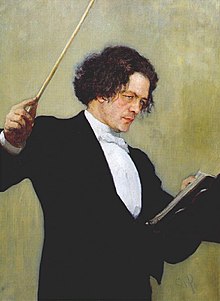Anton Rubinstein
| Anton Rubinstein Антон Рубинштейн |
|
|---|---|

Portrait of Rubinstein by Ilya Repin
|
|
| Born |
November 28, 1829 Vikhvatinets, Podolsk Governorate, Russian Empire |
| Died | November 20, 1894 (aged 65) Peterhof, Russia |
| Occupation | pianist, composer and conductor |
Anton Grigorevich Rubinstein (Russian: Антон Григорьевич Рубинштейн, tr. Anton Grigorevich Rubinshteyn; November 28 [O.S. November 16] 1829 – November 20 [O.S. November 8] 1894) was a Russian pianist, composer and conductor who became a pivotal figure in Russian culture when he founded the Saint Petersburg Conservatory. He was the elder brother of Nikolai Rubinstein who founded the Moscow Conservatory.
As a pianist, Rubinstein ranks amongst the great 19th-century keyboard virtuosos. He became most famous for his series of historical recitals—seven enormous, consecutive concerts covering the history of piano music. Rubinstein played this series throughout Russia and Eastern Europe and in the United States when he toured there.
Although best remembered as a pianist and educator (most notably in the latter as the composition teacher of Pyotr Ilyich Tchaikovsky), Rubinstein was also a prolific composer throughout much of his life. He wrote 20 operas, the best known of which is The Demon. He also composed a large number of other works, including five piano concertos, six symphonies and a large number of solo piano works along with a substantial output of works for chamber ensemble.
Rubinstein was born to Jewish parents in the village of Vikhvatinets in the district of Podolsk, Russia (now known as Ofatinți in Transnistria, Republic of Moldova), on the Dniestr River, about 150 kilometres (93 mi) northwest of Odessa. Before he was 5 years old, his paternal grandfather ordered all members of the Rubinstein family to convert from Judaism to Russian Orthodoxy. Although he was raised as a Christian, Rubinstein would later become a Christian atheist.
...
Wikipedia
